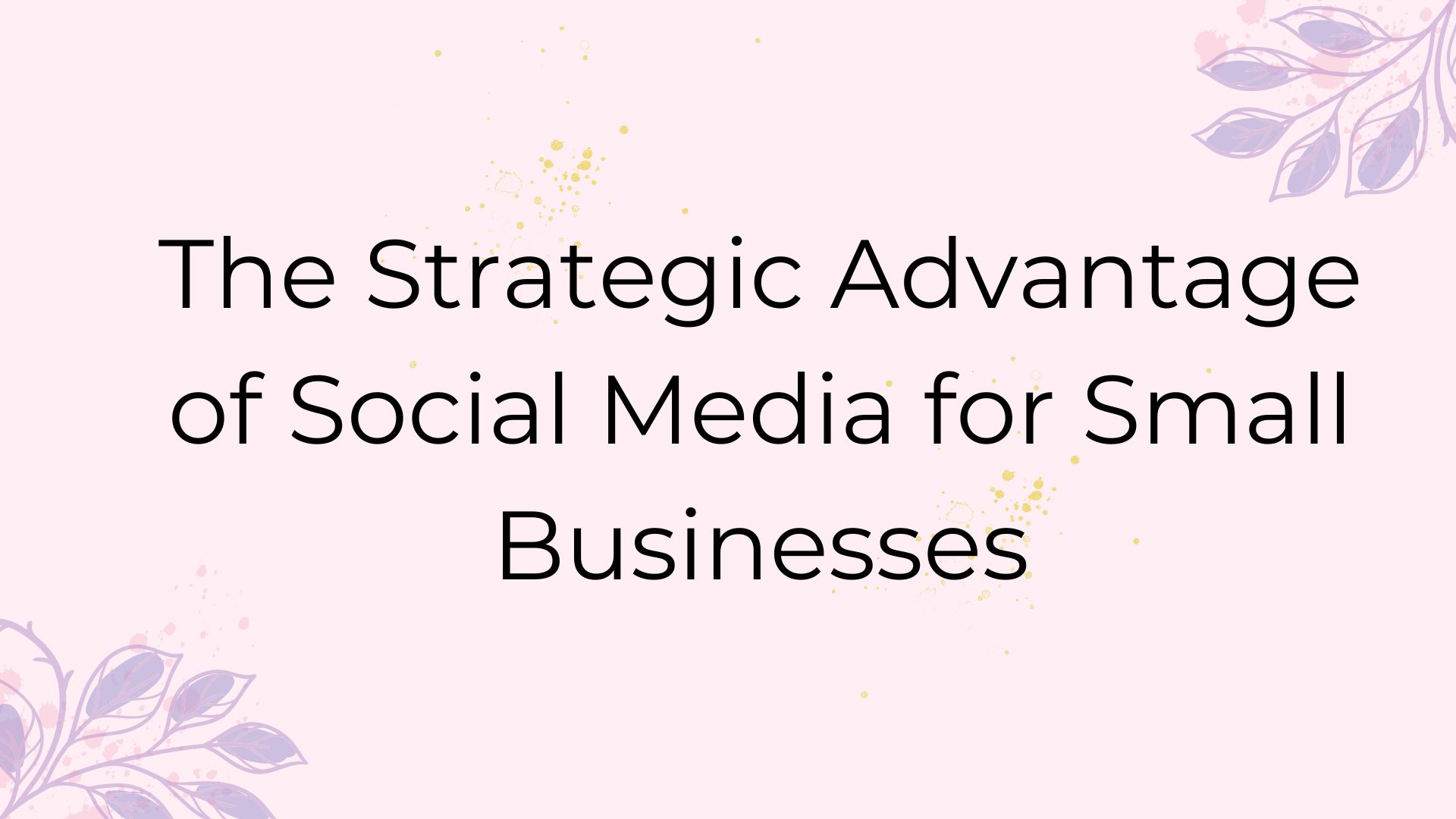
In today’s digital age, social media has become a vital tool for businesses of all sizes. For small businesses, social media offers a unique opportunity to level the playing field with larger competitors. This article will explore the strategic advantages of social media for small businesses, including increased visibility, customer engagement, cost-effective marketing, and more.
Increased Visibility
Building an Online Presence
Small businesses can use social media platforms to build a strong online presence. Creating profiles on popular platforms like Facebook, Instagram, Twitter, and LinkedIn allows businesses to reach a broader audience.
Consistent Branding
Maintaining consistent branding across all social media channels helps small businesses establish their identity. This includes using the same logo, color scheme, and messaging.
Utilizing Hashtags
Using relevant hashtags can increase the visibility of posts and help potential customers find the business. Researching popular hashtags in the industry can boost engagement and reach.
Local Visibility
For small businesses targeting local customers, social media can be a powerful tool.
Geotagging Posts
Adding location tags to posts can help attract local customers who are searching for nearby businesses.
Joining Local Groups
Participating in local community groups on platforms like Facebook can increase visibility among local consumers.
Customer Engagement
Direct Interaction
Social media provides a direct line of communication between businesses and customers.
Responding to Comments
Engaging with customers by responding to their comments and messages shows that the business values their input.
Hosting Q&A Sessions
Hosting live Q&A sessions on platforms like Instagram or Facebook can help businesses address customer questions in real-time.
Building Relationships
Social media allows businesses to build and maintain relationships with their customers.
Sharing User-Generated Content
Encouraging customers to share their experiences and reposting their content can create a sense of community and loyalty.
Running Contests and Giveaways
Contests and giveaways can boost engagement and attract new followers. Simple actions like liking a post or tagging friends can increase reach.
Cost-Effective Marketing
Low-Cost Advertising
Social media advertising is often more affordable than traditional advertising methods.
Targeted Ads
Platforms like Facebook and Instagram offer targeted advertising options that allow businesses to reach specific demographics, interests, and locations.
Sponsored Posts
Promoting posts can increase their visibility without breaking the bank. Even a small budget can lead to significant reach.
Organic Reach
Creating engaging content can help small businesses reach a large audience without spending money on ads.
Posting Regularly
Consistency is key. Regularly posting high-quality content keeps the audience engaged and attracts new followers.
Utilizing Analytics
Using social media analytics tools can help businesses understand what content performs best and refine their strategies accordingly.
Brand Authority
Establishing Expertise
Social media allows small businesses to showcase their expertise in their industry.
Sharing Educational Content
Posting informative articles, how-to guides, and industry news can position the business as a thought leader.
Collaborating with Influencers
Partnering with influencers in the industry can enhance credibility and reach a larger audience.
Building Trust
Transparency and authenticity on social media can help build trust with customers.
Sharing Behind-the-Scenes Content
Giving customers a glimpse behind the scenes can humanize the brand and build a connection.
Addressing Negative Feedback
Handling negative feedback professionally and promptly can turn a negative experience into a positive one and show that the business cares about its customers.
Customer Insights
Gathering Feedback
Social media is a valuable tool for gathering customer feedback and insights.
Running Polls and Surveys
Conducting polls and surveys can provide valuable information about customer preferences and opinions.
Monitoring Conversations
Paying attention to what customers are saying about the brand and industry can provide insights into trends and areas for improvement.
Data Analysis
Analyzing social media data can help businesses make informed decisions.
Tracking Engagement Metrics
Metrics like likes, shares, comments, and click-through rates can provide insights into what content resonates with the audience.
Using Social Listening Tools
Social listening tools can help businesses monitor mentions of their brand and competitors, providing a deeper understanding of the market.
Driving Website Traffic
Linking to the Website
Including links to the business website in social media profiles and posts can drive traffic to the site.
Using Call-to-Actions
Encouraging followers to visit the website through clear call-to-actions can increase web traffic.
Sharing Blog Posts
Posting links to blog articles on social media can attract readers and drive traffic to the site.
SEO Benefits
Social media can also have a positive impact on search engine optimization (SEO).
Increasing Backlinks
Engaging content that gets shared widely can result in more backlinks to the business website, boosting its SEO.
Enhancing Online Presence
A strong social media presence can improve the business’s overall online visibility, making it easier for customers to find them.
Competitive Advantage
Staying Ahead of Competitors
Small businesses can use social media to stay ahead of competitors by keeping up with industry trends and adapting quickly.
Monitoring Competitor Activity
Keeping an eye on competitors’ social media activity can provide insights into their strategies and help businesses identify opportunities.
Innovating with Content
Experimenting with new types of content and staying creative can set a business apart from competitors.
Building a Loyal Community
A loyal social media following can give small businesses a competitive edge.
Engaging Regularly
Regular engagement with followers helps build a strong community and fosters loyalty.
Offering Exclusive Content
Providing followers with exclusive content, discounts, or early access to products can strengthen the connection with the audience.
Enhancing Customer Service
Providing Support
Social media platforms can serve as an additional customer service channel.
Responding to Inquiries
Promptly responding to customer inquiries and issues on social media demonstrates excellent customer service.
Offering Solutions
Providing solutions to customer problems in a public forum can showcase the business’s commitment to customer satisfaction.
Building a Positive Reputation
Effective use of social media for customer service can enhance the business’s reputation.
Highlighting Positive Reviews
Sharing positive reviews and testimonials on social media can build trust and attract new customers.
Addressing Concerns Publicly
Addressing customer concerns publicly and transparently can turn potential negative experiences into positive ones.
Conclusion
Social media offers numerous strategic advantages for small businesses, from increased visibility and customer engagement to cost-effective marketing and competitive advantages. By leveraging social media effectively, small businesses can build a strong online presence, engage with customers, and drive growth. As the digital landscape continues to evolve, social media will remain a crucial tool for small businesses looking to succeed in a competitive market. For those seeking to enhance their social media presence, considering affordable SMO services can provide a significant boost in achieving their goals.
FAQs:
1. How can small businesses increase their visibility on social media?
Small businesses can increase their visibility on social media by building a consistent online presence. This includes creating profiles on popular platforms like Facebook, Instagram, Twitter, and LinkedIn, maintaining consistent branding across all channels, and utilizing relevant hashtags. Additionally, geotagging posts and joining local community groups can help attract local customers.
2. What are some effective ways for small businesses to engage with their customers on social media?
Effective ways for small businesses to engage with their customers on social media include responding to comments and messages, hosting live Q&A sessions, sharing user-generated content, and running contests and giveaways. Regular interaction and building relationships through these activities can create a loyal customer base and foster a sense of community.
3. How can social media help small businesses drive website traffic?
Social media can help drive website traffic by including links to the business website in profiles and posts, using clear call-to-actions, and sharing blog posts and other content that directs followers to the website. Additionally, social media activity can enhance SEO by increasing backlinks and improving the business’s overall online presence, making it easier for customers to find them.






